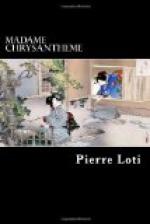Yes, seen from behind, they are very pretty; they have, like all Japanese women, the most lovely turn of the head. Moreover, they are very funny, thus drawn up in line. In speaking of them, we say: “Our little dancing dogs,” and in truth they are singularly like them.
This great Nagasaki is the same from one end to another, with its numberless petroleum lamps burning, its many-colored lanterns flickering, and innumerable panting djins. Always the same narrow streets, lined on each side with the same low houses, built in paper and wood. Always the same shops, without glass windows, open to all the winds, equally rudimentary whatever may be sold or made in them; whether they display the finest gold lacquer ware, the most marvelous china jars, or old worn-out pots and pans, dried fish, and ragged frippery. All the salesmen are seated on the ground in the midst of their valuable or trumpery merchandise, their legs bared nearly to the waist. And all kinds of queer little trades are carried on under the public gaze, by strangely primitive means, by workmen of the most ingenuous type.
Oh! what wonderful goods are exposed for sale in those streets! what whimsical extravagances in those bazaars!
No horses, no carriages are ever seen in the town; nothing but people on foot, or the comical little carts dragged along by the runners. Some few Europeans straggling hither and thither, wanderers from the ships in harbor; some Japanese (fortunately as yet but few in number) dressed up in coats; other natives who content themselves with adding to their national costume the pot hat, from which their long sleek locks hang down; and all around, eager haggling, bargaining,—and laughter.
In the bazaars every evening our mousmes make endless purchases; like spoilt children they buy everything they fancy: toys, pins, ribbons, flowers. And then they prettily offer each other presents, with childish little smiles. For instance, Campanule buys for Chrysantheme an ingeniously contrived lantern on which, set in motion by some invisible machinery, Chinese shadows dance in a ring round the flame. In return, Chrysantheme gives Campanule a magic fan, with paintings that change at will from butterflies fluttering round cherry-blossoms, to outlandish monsters pursuing each other across black clouds. Touki offers Sikou a cardboard mask representing the bloated countenance of Dai-Cok, god of wealth; and Sikou replies by a long crystal trumpet, by means of which are produced the most extraordinary sounds, like a turkey gobbling. Everything is uncouth, fantastical to excess, grotesquely lugubrious; everywhere we are surprised by incomprehensible conceptions, which seem the work of distorted imaginations.
In the fashionable tea-houses where we finish up our evenings, the little servant-girls now bow to us, on our arrival, with an air of respectful recognition, as belonging to the fast set of Nagasaki. There we carry on desultory conversations, full of misunderstandings and endless quid pro quo’s of uncouth words,—in little gardens lighted up with lanterns, near ponds full of gold fish, with little bridges, little islets and little ruined towers. They hand us tea and white and pink-colored sweetmeats flavored with pepper that taste strange and unfamiliar, and beverages mixed with snow tasting of flowers or perfumes.




